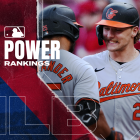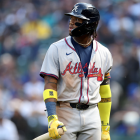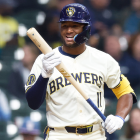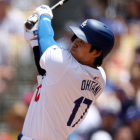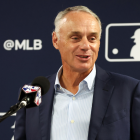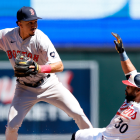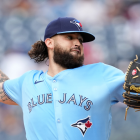Over the last several years, the opt-out clause has become a major factor on the free agent market. Want to sign a big free agent? Okay, but you're not only going to have to pay him handsomely, you're also going to have to give him an opt-out clause so he could potentially land an even bigger contract at some point. They come with the territory now.
The opt-out clause has been around for a while now -- J.D. Drew opted out of his contract with the Dodgers following the 2006 season, then signed with the Red Sox -- though they really became en vogue when Alex Rodriguez opted out of his contract in the middle of the 2007 World Series. After that, every elite free agent sought an opt-out. Nowadays even mid-range free agents are getting them.
This coming offseason six players, including one 2017 All-Star, will be able to opt out of their contracts and re-enter free agency. Will they actually exercise the opt-out clause? That's not quite as clear. Here are the six looming opt-out decisions.
Marlins lefty Wei-Yin Chen seems like an easy "no." He figures to pass on the opt-out and collect the $52 million from 2018-20. Chen had a 4.96 ERA (80 ERA+) in 22 starts and 123 1/3 innings last year, and this year he threw 27 innings in five starts with a 4.33 ERA (97 ERA+) before being shut down with a partially torn ligament in his elbow.
Chen will begin a minor league rehab assignment Tuesday according to Tim Healey of the Sun Sentinel, so he figures to be back on a big league mound at some point in September. That should give him three, maybe four starts to strut his stuff for scouts before the opt-out decision. It's hard to think Chen can do enough in those few starts to convince teams he's worth more than $52 million over the next few years, especially given the elbow injury.
A year ago Giants righty Johnny Cueto threw 219 2/3 innings with a 2.79 ERA (144 ERA+) and finished sixth in the NL Cy Young voting. His six-year, $120 million contract looked like a bargain given what other top starters (David Price, Zack Greinke) received last winter. Using the opt-out to test the free agent waters again seemed like a no-brainer.
This year, Cueto has a 4.59 ERA (91 ERA+) in 19 starts and 115 2/3 innings, and he hasn't pitched for San Francisco since July 14 due to ongoing blister and forearm injuries. He is expected to return to the team in September and make a few starts. Remember, the last time Cueto was a free agent, there was concern about his elbow and his poor performance after being traded to the Royals. He still landed a huge contract.
Now though, Cueto is two years older, his performance in a pitcher's ballpark in the non-DH league has really cratered, and he has some injury problems. The blisters are whatever. They happen. The forearm is of greater concern because forearm problems tend to be a symptom of an underlying elbow issue. My guess right now is no, Cueto will not opt-out.
Almost certainly a "no." Royals righty Ian Kennedy has a 5.06 ERA (89 ERA+) in 23 starts and 122 2/3 innings this year, and he's going to be 33 in December. Kennedy is a good source of innings -- he's on track to make 30-plus starts for the eighth straight season -- and that's about it. This past offseason similar veteran innings guys like Jason Hammel (two years, $16 million), Ivan Nova (three years, $26 million), and Edinson Volquez (two years, $22 million) all signed for much less than the three years and $43 million Kennedy would be leaving on the table. He's staying.
Probably the most fascinating opt-out case this offseason. A year ago Yankees righty Masahiro Tanaka pitched like a bona fide ace, throwing 199 2/3 innings with a 3.07 ERA (143 ERA+). That earned him a seventh place finish in the AL Cy Young voting. This year, however, Tanaka has a 4.86 ERA (96 ERA+) in 24 starts and 140 2/3 innings. Terrible numbers overall, obviously, but it has been a tale of two seasons. Check it out:
IP | ERA | FIP | WHIP | K/9 | BB/9 | HR/9 | |
First 12 starts | 66 | 6.55 | 5.68 | 1.50 | 7.9 | 2.5 | 2.3 |
Last 12 starts | 74 2/3 | 3.38 | 3.66 | 1.04 | 10.5 | 1.8 | 1.5 |
2017 total | 140 2/3 | 4.86 | 4.61 | 1.26 | 9.3 | 2.1 | 1.9 |
Tanaka was one of the worst pitchers in baseball during his first 12 starts of the season. During the last 12, he's pitched like regular old Masahiro Tanaka. There's basically nothing he can do now to make his overall season numbers look good, but if Tanaka continues pitching like himself the rest of the year, he's going to have a pretty strong body of work heading into the offseason.
Complicating things is the elbow injury Tanaka suffered back in 2014. He has a partially torn elbow ligament, and while he missed just about the entire second half that season, he's had no trouble with the elbow since. Most expect him to need Tommy John surgery at some point, though other pitchers have pitched with partially torn ligaments for years. Ervin Santana, most notably, has pitched with one for more than a decade now.
Tanaka will turn 29 this offseason, so he's right smack in the prime of his career. And looking at his overall MLB career, his first 12 starts this year are the outlier. He's shown he can pitch at a high level in a tough hitter's park in the DH league. I don't think Tanaka will be able to match the $22.3 million average annual value of his current deal, but if he opts out, I think he'd be able to beat the $67 million remaining on his deal. As long as he stays healthy the rest of the way, I think Tanaka opts out.
Justin Upton is basically the anti-Cueto when it comes to the opt-out. Upton's first year with the Tigers was pretty underwhelming and it looked like he'd be sticking around a while. This year, Upton is hitting a robust .281/.365/.543 (139 OPS+) with 26 home runs, and it very well might be the best year of his year. He was a deserving All-Star last month.
Upton has three things going for him: he's still reasonably young (he turns 30 Friday), he's having a strong year, and his overall track record is very good. One thing working against him is MLB's collective disinterest in paying top dollar for bat-only players. Upton's not a great defender these days and he won't add a ton of value on the bases. His best position is the batter's box, and that's fine. If you have one skill, being able to hit is a good one to have.
As with Tanaka, Upton probably won't match the $22 million annual average value of his current contract, but if he opts out, he should be able to secure a larger total guarantee. Perhaps he settles for a similar guarantee with a team in a more favorable situation (i.e. a contender), and hey, that's not nothing. Edwin Encarnacion, another bat-only player, received a three-year contract worth $60 million last season. That seems like the worst case scenario should Upton opt-out. I think he opts out.
For all intents and purpose, Matt Wieters joined the Nationals on a one-year contract with a player option last year. It's technically a two-year contract with an opt-out, but opt-outs and player options are functionally the same thing. Anyway, Wieters is hitting a career worst .232/.290/.365 (68 OPS+) with nine home runs this season, and the catcher metrics at Baseball Prospectus say his defense is way down too. It wasn't until February 24 that Wieters signed last offseason. He's not going to walk away from $10.5 million coming off the worst year of his career. Wieters is passing on that opt-out.
So, among the six players with opt-out clauses this offseason, I count four nos (Chen, Cueto, Kennedy, Wieters) and two yeses (Tanaka, Upton). One of those yeses (Tanaka) is not firm either. Tanaka could easily decide to take the guaranteed money following a poor overall season. Wouldn't be unreasonable. That said, Tanaka or Upton not opting out wouldn't shock me nearly as much as one of the other four guys opting out.
These opt-out clauses are great for players and not so great for teams. The best case scenario for the team is what, the player performs well and opts out, so you don't get stuck with his decline? It rarely works like that. Usually when a player performs well enough to opt-out, his team wants to keep him around. Opt-out clauses are requested by the player and a concession made by the team. Nowadays, they are a regular part of free agency. You won't land a premium free agent without one.




















